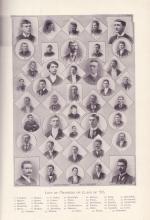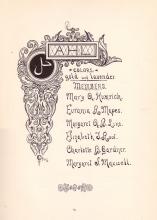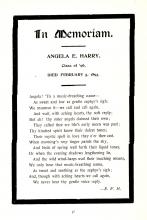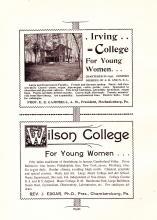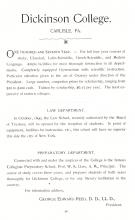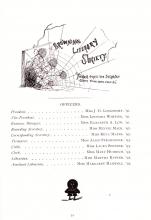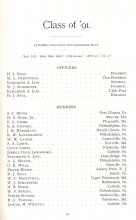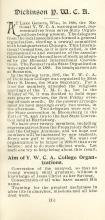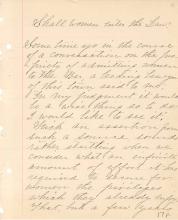First Known Sorority is Secret
The first mention of a sorority is documented in the 1893 Microcosm amidst the pages of fraternities. All that is stated is the initials A.H.L. as well as their colors, gold and lavender. The members include Mary A. Humrich, Eurania R. Mapes, Margaret A. B. Line, Elizabeth Root, Charlotte B. Gardner, and Margaret S. Maxwell. No further explanation is given about the chapter and it is never mentioned again in any subsequent yearbooks.
Death of a Fellow Female Classmate
Written in the 1893 Microcosm is a memorium to Angella E. Harry, who would have graduated in 1896. The poem inserted was written by her sister, Emma V. Harry, who also attended Dickinson College and was in the class of 1895. Further documentation states that Angela died in Carlisle, but the cause of her death is not documented. Her death was also unmentioned in a following account of the class of 1896's events that year.
1891 Microcosm "dedicated" to women
In the 1891 Microcosm, there is a dedication page with a satirical poem that is dedicated to girls. This poem is clearly mocking them by stating that to men they are "the creators of his happiness and the destroyers of his peace" and that this book is "affectionately dedicated" to them. On the following page is a drawing of a suggestively dressed female, again mocking women.
Advertisement for Dickinson College in the 1890 Microcosm
The 1890 Microcosm shows an advertisement for Dickinson College and the services it offers. In the category of the Preparartory Department, the advertisement mentions, "The course of study covers three years, and prepares students of both sexes thoroughly for Dickinson College, or for any literary institution in the country." This shows the college's acceptance of co-education by advertising directly for new students of both sexes.
Browning Literary Society of 1890
The Browning Literary Society was the first mention in the 1890 Microcosm of a society with female involvment. The society was completely comprised of women. It seems that almost all the women who were on campus were involved with the Browning Literary Society. The President was Jessica Dale Longsdorff, Vice-President was Leonora Whiting, Business Manager was Elizabeth A.
Junior Class of 1891 in the Microcosm
A page in the 1890 Microcosm lists the officers and members of the Junior class of 1891, denoting three women who were attending Dickinson. These three women were Elizabeth A. Low, Jessica Dale Longsdorff, and Leonora M. Whiting. Under the class officers, Elizabeth A. Low held two positions as secretary and class poet. Along with three other male names, the three women's names were politely spelled out rather than initialed.
Young Women's Christian Association acknowledged in 1898 Student Handbook
The student handbook of 1898, published by the Young Men's Christian Association, contains the first mention of women, specifically of the Young Women's Christian Assocation. Included in the welcoming address, the Young Women's Christian Association is aknowledged as a contributing organization to the student handbook. Pages 16-17 of the student handbook provide a brief overview of the organization as well as its mission.
Shall Women Enter the Law?
This oration analyzes whether or not women should be permitted to study and practice law. Low argues that since procured positions within the medical field, philanthropic organizations, newspapers and academia, "humanity has been lifted up during the period in which she has been permitted to play her legitimate part in the drama of human life." However, she argues that woman's work is not done and that women must continue to fight for equal acess as men will not freely give up their power within closed professions, particularly the law.

